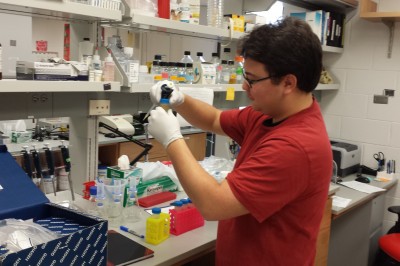Fellowship leads to publication, opportunities after graduation
David Yamaguchi’s path to being co-author on a paper published in the journal Cellular and Molecular Life Sciences started with a summer Cornell Fellowship at the University of Iowa’s department of biochemistry.

He spent 11 weeks in a lab there during the summer of 2013 helping to research the way proteins get their instructions and how they are directed to various parts of the cell. From his first week, he said, he was grateful for what he’d learned at Cornell College. “Professor Craig Tepper’s Cell and Molec class really gave me a solid foundation for biochemical lab work, and that prepared me to a greater degree than most of the other lab members were anticipating,” he said.
The rest of his fellowship went just as well. In addition to his work in the lab, he was able to meet several times with biology Professor Barbara Christie-Pope, who was also doing research at the University of Iowa that summer. His fellowship was so successful that he was asked back to the lab for the summer of 2014, this time funded by the University of Iowa. His second summer was spent trying to find new ways to examine and capture how proteins are formed and how they’re directed to certain parts of cells.
When a protein gets placed in the wrong part of a cell membrane, he said, it can cause catastrophic diseases. But scientists aren’t sure how proteins get to the correct position.
“Until we have an idea of how it’s supposed to work, we have no idea how to fix it,” he said.
The lab he worked at is using photoreceptor cells from tadpoles to create a model of how one protein is assembled, and how it gets directed to the proper place. And the research he worked on in the summer of 2013 helped lead the lab to the first part of that model, which was published in August in Cellular and Molecular Life Sciences.
And Yamaguchi, who finishes his graduation requirements at the end of Block 2, isn’t done yet. After he finishes his coursework he’s going to spend another eight weeks at the same lab, working with Yuan Pan, a graduate student, on another publication about the lab’s research. From there, he plans to apply for lab technician jobs in Colorado and Iowa.
“I know I want to be involved with research in some way for the rest of my life, even if I’m still figuring out exactly what career path to follow,” he said, “This is a way for me to get more experience.”



